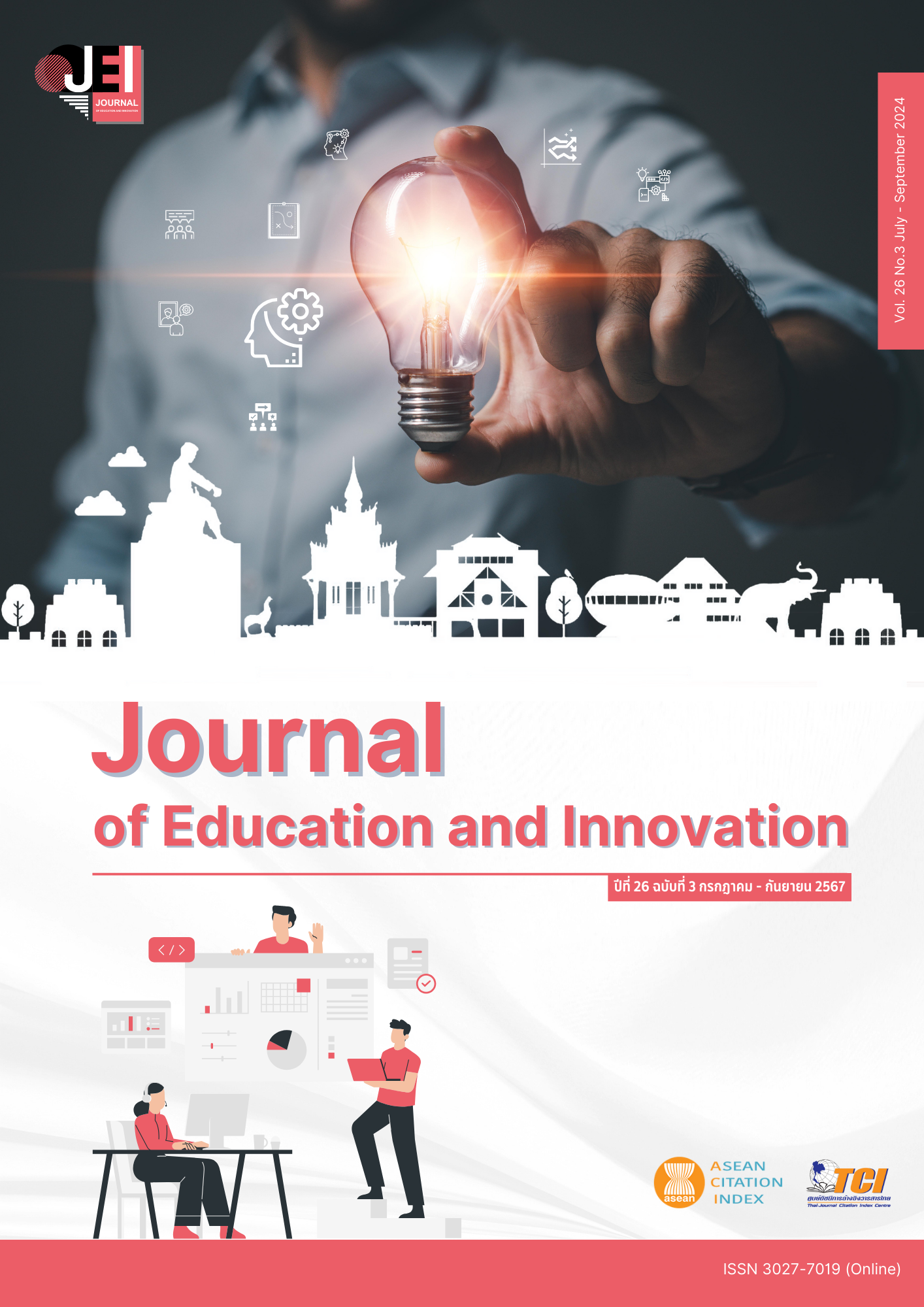STUDENT TEACHER’S PERSPECTIVE ON INCLUSIVE EDUCATION IN DIGITAL DISRUPTION ERA, CASE STUDIES IN SOME RAJABHAT UNIVERSITY IN BANGKOK
Main Article Content
Abstract
This qualitative research aimed to investigate student teacher’s perspective on inclusive education in the digital disruption era and their self-efficacy towards science learning management in an inclusive classroom. The research methodology was a qualitative case study of Rajabhat University in Bangkok, Thailand, and participants were 51 student teachers studying for the Bachelor of Education in General Science program. The research instruments included open-ended questionnaires and semi-structured interviews. Then, the data were analyzed by content analysis and examined for credibility by method triangulation and peer debriefing. The findings revealed that the student teachers hold six issues about inclusive education in schools, as follows: 1) inclusive education expresses equitable education in science; 2) the diversity of learners’ abilities made classroom management difficult; 3) digital technology was an important factor for learning activation; 4) this perhaps brought educational and social inequality; 5) a disabled learner might become a victim of cybercrime in a classroom; 6) the special needs should have specialized classrooms for them. In addition, the student teacher viewed themselves as a teacher with competencies in learning management for the inclusive classroom at a moderate level and needed more support from teachers and parents about caring for students with special needs.
Article Details

This work is licensed under a Creative Commons Attribution-NonCommercial-NoDerivatives 4.0 International License.
The owner of the article does not copy or violate any of its copyright. If any copyright infringement occurs or prosecution, in any case, the Editorial Board is not involved in all the rights to the owner of the article to be performed.
References
Arsingsamanan, W., Kijkuakul, S., & Supap, W. (2020). Science Teachers’ View on Learning Management in Enrichment Science Classroom. Journal of Education Naresuan University, 22(3), 235-247.
Charoen-Rajapark, R. A., & Charoen-Rajapark, V. (2022). The educational changing: Digital learning and new innovations. Journal of Multidisciplinary in Humanities and Social Sciences, 5(4), 1724-1739.
Electronic Transactions Development Agency. (2020). Digital Divide. Retrieved April 2, 2023, from https://www.etda.or.th/th/UsefulResource/terminology/%E0%B8%AB%E0%B8%A1%E0%B8%A7%E0%B8%94%E0%B8%AB%E0%B8%A1-D/228.aspx
Kaewtubtim, T. (2021). The expansion of organized cybercrime during the COVID-19 pandemic. Journal of Criminology and Forensic Science, 7(2), 163-180.
Kang, D. Y., & Martin, S. (2018). Improving learning opportunities for special education needs (SEN) students by engaging pre-service science teachers in an informal experiential learning course, Asia Pacific Journal of Education, 38(3), 319-347.
Mano, P. (2020). The impact of digital disruption to the education. Journal of Industrial Education, 18(1), 1-6.
Merriam, S. B., & Tisdell, E. J. (2016). Qualitative Research: A Guide to Design and Implementation (4th ed.). San Francisco, CA: Jossey Bass.
Ministry of Foreign Affairs of Thailand, Department of International Organizations. (2008). Universal Declaration of Human Rights. Retrieved January 14, 2023, from https://humanrights.mfa.go.th/upload/pdf/udhr-th-en.pdf
Nawanidbumrung, W., Samiphak, S., & Inoue, N. (2022). The impact of pre-service teachers’ pedagogical beliefs on teaching science as inquiry: A silent antagonist for effective inquiry-based science lessons. Science Education International, 33(1), 112-121.
Office of the Education Council. (2010). Education Plan (B.E. 2552-2559). Bangkok: Prikwarn Graphic.
Prongsantia, S., Bulao, S., & Tawkaew, P. (2021). Screening Process for Educating Students with Special Needs. Journal of Psychology Kasem Bundit University, 11, 103-112.
Suea-ngam, K., & Srisukvatananan P. (2021). A development of on-task behavior in an inclusive classroom by using positive classroom management. Journal of Research and Development in Special Education, 10(2), 69-81.
Tantixalerm, C., & Amornpaisarnloet, W. (2021). Developing prototype of student support and development system for inclusive schools. Journal of Ratchasuda College for Research and Development of Persons with Disabilities, 17(2), 82-102.
Thirapat, Y. (2021). Inclusive education management of basic education school (Master thesis). Nakhon Prathom: Silpakorn University.
Thumthong, B., & Wannit, P. (2022). Education in the era of digital disruption and the impact of the Covid-19 situation towards learning management in Thai educational schools. The Golden Teak: Humanity and Social Science Journal, 28(3), 1-13.
Viriyangkura, Y., Napanang, P., & Sinbenjapong, W. (2021). Behavior management for special educators. Bangkok: Chulalongkorn University Press.


